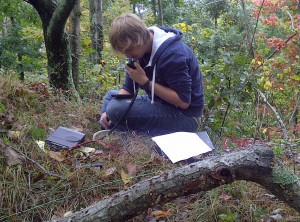Town: Three Rivers
Callsign: K1MAZ
Previous Callsigns: KB1VYZ (never used on the air)
License Class: Extra
Main station equipment: Kenwood TS-450 (borrowed from NE1C) with a G5RV and 160m inverted L
Favorite Band(s): 17m, 15m
Favorite Mode(s): SSB
Year you were first licensed and license class: 2011 General
How did you become interested in amateur radio?
I became interested in amateur radio through exposure from Kx1x and NE1C at various Scout functions. Although I did the radio merit badge in 2003 with John at scout camp, it wasn’t until last year that it really peaked my interest. I took my license test and made to General in the first go. I then upgraded to Extra two months later.
What are some of your favorite aspects of the hobby?
I enjoy contesting, both from my house and at stations such as K1TTT as well as casual DXing. I’ve recently become involved with Summits on the Air which is an excellent way to combine my love of the outdoors with my love of radio.
What is your most memorable experience in the hobby?
My most memorable experience in the hobby would have to be opening a packet from the ARRL expecting membership solicitations but finding a certificate for first place in the 2011 phone Sweepstakes for single operator low power in Western Mass. This goes to show that anyone can win a contest with a piece of wire in the air and a little effort.
If different from the above question, what was your most memorable contact on the radio?
I would say that I have two most memorable contacts. The first was with KC3FL in Florida. He originally lived up here and we spent quite some time ragchewing about the area. The second was my first ZL contact which was on 20m past midnight. After a couple calls, I was ecstatic when I heard my call come back to me.
What do you feel ham radio operators must do to help ensure the future of the hobby?
There are two big things, in my opinion, that ham operators need to use to ensure the future of the hobby. First of all, proper manners on the air will go a big way. Following rules like the DX Code of Conduct will not only help make the airwaves a more pleasant place to be but will help to make large pileups less intimidating for new users. Second of all, elmers can really make a big difference. I wouldn’t be as involved in the hobby as I am without the support, encouragement, and ideas from a lot of the elmers in the community and HCRA. Being receptive and supportive of new and/or novice hams as well as interested individuals can play a big role in the survival of the sport, especially since the younger generation is the future of the hobby.
